What is a Hypothesis? - Simple Explanation for Kids
Learn about what a hypothesis is with this easy-to-understand explanation tailored for children. Discover how scientists make guesses to understand the world better.
Alright kiddo, imagine we are detectives, and we want to solve a mystery about the world around us. A hypothesis is like a special guess that detectives (or in this case, scientists) make to find out why something happens.
Let's say you wonder why plants grow. You might guess, 'I think plants grow because they get water.' That's your hypothesis! It's your best idea right now for why plants grow.
But hold on! Having a hypothesis isn't the end. We need to test it to see if it's true. So, you could water some plants and see if they grow. If they do, your guess was right. If they don't, you need a new hypothesis.
A hypothesis isn't always right, and that's okay! It's like trying different keys to open a treasure chest. Sometimes it takes a few tries to find the right one, and each try teaches you something new.
So, a hypothesis is a smart guess we make to help solve a mystery about our world by testing it out. And guess what? Even grown-up scientists do this, just like you. Cool, right?

See More...
- Understanding Constellations for 5-Year-Olds: A Simple Guide to Stars
- Understanding Summative Assessment: Examples, Benefits, and Uses for Educators
- Fun Facts About Dolls for 6-Year-Old Kids
- Fun Candy Facts for 6-Year-Old Kids
- Fun Carrot Facts for Kids Age 6
- Fun Carrot Facts for 5-Year-Old Kids
- Fun Carrot Facts for 4-Year-Old Kids: Discover the Wonders of Carrots
- Fun Palm Tree Facts for Kids Aged 4: Discover the Wonders of Palm Trees
- Fun Facts About Warmest Socks for 4-Year-Olds
- Fun Facts About Socks for 4-Year-Olds
Upgrade Your Account
All paid plans include:, unlimited access to all tools.
Full use of Subject Explorer, Lesson Planner, Worksheets and more
Visual Understanding
Upload and analyze photos with advanced AI capabilities
Upgraded Intelligence
Get smarter, more relevant analysis for better insights
Good for Individual Learning
- Manage 1 Student (1 Primary)
- Analysis based on student age
- Unlimited access to all 10 Learning Corner tools
Good for Siblings
- Add & Manage 2 Students (1 Primary + 1 Additional)
Good for Small Groups
- Add & Manage up to 5 Student Profiles (1 Primary + 4 Additional)
- Priority support
Good for Larger Groups
- Add & Manage up to 10 Student Profiles (1 Primary + 9 Additional)
Try Before You Buy
- 3 Subject Explorer analyses per month (non-logged in)
- 5 Subject Explorer analyses per month (with free account)
- Access to basic features
Note: Your primary account is your first student profile. You can update your profile from the "My Account" dropdown in the main menu.
Educational institutions and large organizations: Email [email protected] for tailored pricing.
Email This Document
- Leave Feedback
Explain Anything
Got a feature request or is something not working? Let us know here or comment on Facebook .
Get Your ALL ACCESS Shop Pass here →
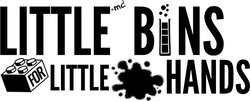
Hypothesis for Kids with Examples
When you begin exploring a science topic , one of the first steps in the scientific method is making a hypothesis . But what exactly does that mean? Let’s break it down and learn how to write a simple hypothesis for kids. Use it in your next science experiment , and understand the key parts that make a hypothesis testable!

What Is a Hypothesis for Kids?
A hypothesis is more than an educated guess about what will happen during an experiment. It’s your prediction based on the information you already know. A hypothesis is part of the scientific method , where you take a guess and then test that guess through experimentation .
Why Use the Scientific Method?
It is a process or method of research to help solve a problem. Try incorporating it into your next science experiment with the helpful examples below. The scientific method helps us:
- Stay Organized : It gives us clear steps to investigate one thing at a time.
- Make Better Predictions : It helps us think carefully about what might happen (make a hypothesis) before we begin testing.
- Learn from Mistakes : If our experiment doesn’t go as planned, we can understand why and try again.
- Find Real Answers : The scientific method is a reliable way to find answers to questions based on what we observe, not just what we think or feel.
💡 Read more about the Scientific Method [here] and Variables in Science [here] .
What Are the Scientific Method Steps?
- Ask a Question Start by being curious! Ask, “What happens if I plant a seed in sand instead of soil?”
- Do Research Before jumping into an experiment, gather information. You can look in books, ask a teacher, or search the internet. Doing research helps you understand what others already know about your topic.
- Make a Hypothesis A hypothesis is not just an educated guess . It is an informed statement based on what you already know. After doing your research, you might predict, “I think the plant will not grow as well in sand as it does in soil.”
- Test the Hypothesis Now it’s time to experiment! Try planting seeds in both sand and soil and see what happens. This step lets you find out if your guess was right.
- Collect Data Write down what you observe. Maybe the plant in soil grows faster and taller than the one in sand. Keeping a journal or recording data helps you see patterns.
- Draw Conclusions Look at your results and decide if your hypothesis was correct. If it wasn’t, that’s okay! You’ve still learned something new.
- Share Results Scientists often share what they’ve learned with others. You might share your findings with your class or write a report. Keep a journal or notebook to refer back to for other experiments.
How Does Scientific Research Help?
Research is an important part of the scientific method because it helps us:
- Build on What We Know : We can learn from what others have already discovered before experimenting.
- Make Better Hypotheses : When we research, we make more informed predictions about what might happen during the experiment. We don’t just guess!
Why Should We Use the Scientific Method?
The scientific method isn’t just for scientists—it’s for anyone who wants to solve problems, answer questions, and learn about the world. By following these steps, we can:
- Think critically about what we’re investigating.
- Test our ideas in a fair and organized way.
- Learn from our experiments and improve our understanding.
💡 The scientific method teaches us that even if our hypothesis is wrong, that’s still valuable! Every experiment is a chance to learn something new, making science fun and exciting for all ages.
How to Write a Simple Hypothesis for Kids
You can follow this easy format to write a simple hypothesis with kids :
💡 “If [I change this], then [this will happen].”
For example:
- If I add more water to the plant, then it will grow taller.
- If I heat the water, then the candy will dissolve faster.
When you make a hypothesis, you need to consider the variables in your experiment. A variable is anything that can change in the experiment. There are different types of variables to consider:
- Independent Variable – This is the part of the experiment you change on purpose. For example, the amount of water you give a plant.
- Dependent Variable – This is the result you measure in response to the independent variable. For example, how tall the plant grows.
- Free Science Worksheets
Add this helpful science information pack to your next science experiment!

Hypothesis for Kids Examples
Here are some examples of hypotheses that are grade-level appropriate :
- Elementary school : “If I use warm water, then sugar will dissolve faster than in cold water.”
- Middle school : “If I increase the density of the liquid, then the object will float higher.”
💡By focusing on the independent and dependent variables , you’ll create a clear and testable hypothesis.
Using a Hypothesis with Young Kids
You can introduce the idea of hypotheses to young kids and even preschoolers! While the concept needs to be simplified, young children are naturally curious and already make guesses about how things work in their everyday play. By guiding them to think of these guesses as predictions they can test, you can start teaching them the basics of a hypothesis.
How to Introduce Hypotheses to Preschoolers
For young children, using language they understand is key. Instead of saying “hypothesis,” you might say:
- “What do you think will happen?”
- “Let’s make a prediction .”
Simple Steps to Writing a Hypothesis with Preschoolers
- Start with a question : Ask them something simple and observable, like “What do you think will happen if we add water to the sand?”
- Make a prediction : Encourage them to say what they think will happen. For example, “I think the sand will get wet and sticky.”
- Test it : Let them try the simple science experiment to see if their prediction was right.
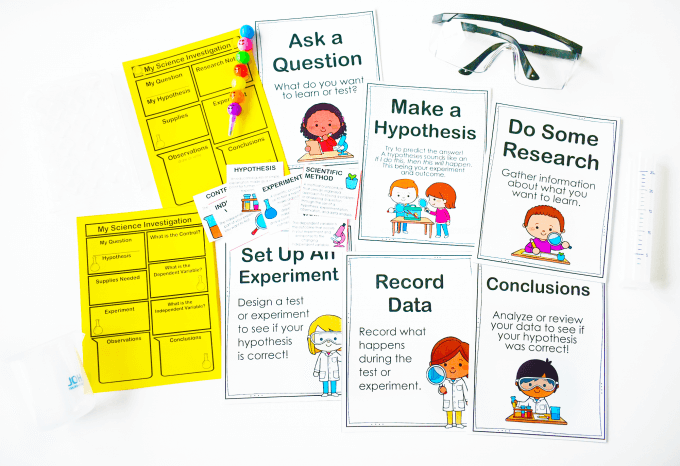
Simple Science Experiments for Hypotheses
Here are some great science projects where you can practice writing a hypothesis and testing it through experimentation :
Plant Growth Experiment : Observe how different amounts of light affect plant growth. You might write a hypothesis like: “If I put the plant in more sunlight, then it will grow faster.”
Paper Towel Absorbency Test : Compare different brands of paper towels to see which absorbs more water. A hypothesis example could be: “If I use Brand X, then it will absorb more water than Brand Y.”
Floating and Sinking with Density : Test how different liquids (like water and oil) affect the ability of objects to float. Write a hypothesis such as: “If I place the object in oil, then it will float higher than in water due to the difference in density .”
Baking Soda and Vinegar Volcano : This classic experiment shows how mixing baking soda and vinegar creates a reaction that produces gas. You can write a hypothesis such as: “If I increase the amount of baking soda, then the reaction will create more gas and a bigger ‘eruption.’”
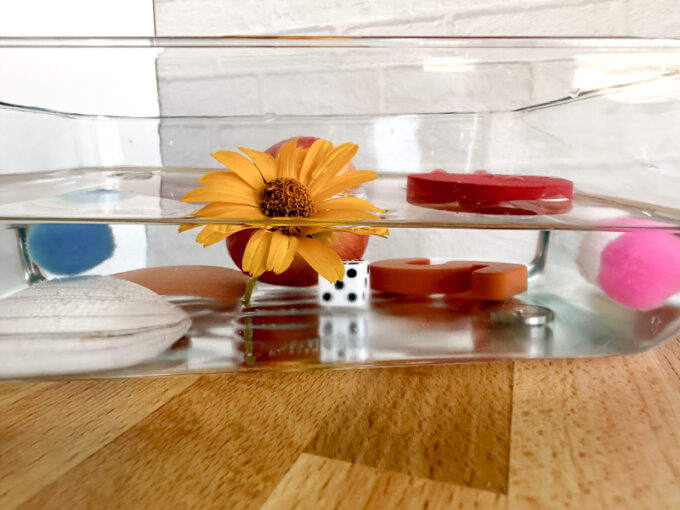
Keeping Track of Your Hypothesis
As part of the scientific method, it is important to keep detailed records of your hypothesis and experiments in journals or a scientific notebook . This will help you track your predictions, results, and conclusions.
💡 Writing things down helps you reflect on what worked and what didn’t—and it’s a key part of learning from your experiments!

Practice Makes Perfect!
Writing a hypothesis is a skill that gets better with practice. You’ll become a stronger scientist by starting with a simple hypothesis and using it in experiments with clear variables. Test different science activities, make educated guesses, and discover what happens!
💡 Whether your hypothesis is right or wrong, what’s most important is learning through experimentation.
More Science Projects for Kids
- Alka Seltzer Reaction Rate Experiment
- Dissolving Candy Experiment
- What Dissolves Experiment
- Sugar and Yeast Experiment
- Heat Absorption Experiment
- Plant Growth Experiment

Helpful Science Resources
Here are a few resources to help you introduce science more effectively to your kids or students and feel confident presenting materials. You’ll find helpful free printables throughout.
- Printable Science Project Pack 👇
- Best Science Practices (as it relates to the scientific method)
- Science Vocabulary
- All About Scientists
- DIY Science Kits
- Science Tools for Kids
- Scientific Method for Kids
- Citizen Science Guide
- Join us in the Club
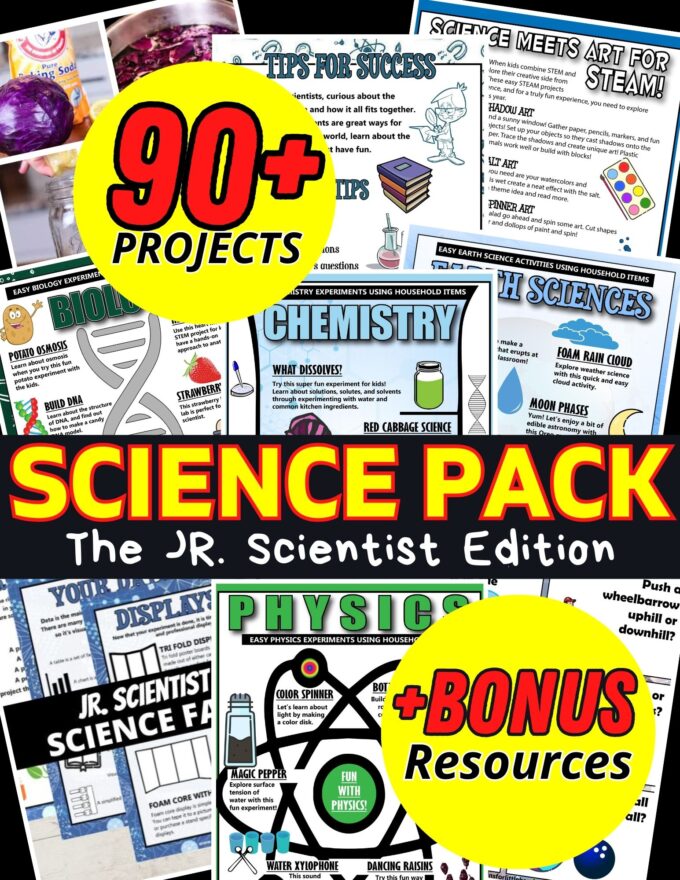
Subscribe to receive a free 5-Day STEM Challenge Guide
~ projects to try now ~.
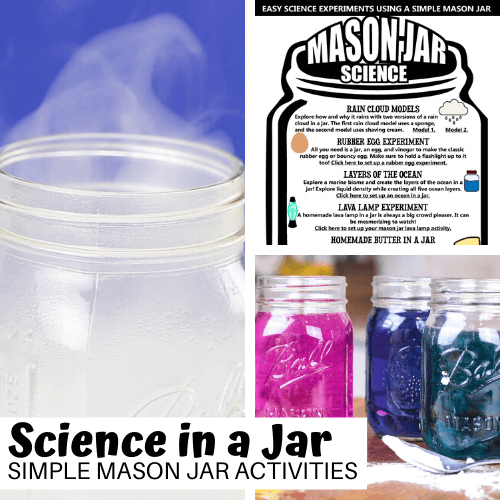
- Español NEW
Hypothesis facts for kids
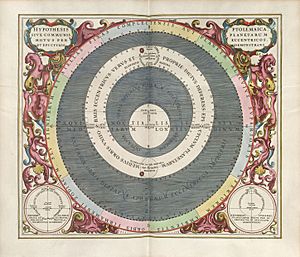
A hypothesis is a proposed explanation for some event or problem.
Cardinal Bellarmine gave a well known example of the older sense of the word in his warning to Galileo in the early 17th century: that he must not treat the motion of the Earth as a reality, but merely as a hypothesis.
Today, a hypothesis refers to an idea that needs to be tested . A hypothesis needs more work by the researcher in order to check it. A tested hypothesis that works, may become part of a theory or become a theory itself. The testing should be an attempt to prove the hypothesis is wrong. That is, there should be a way to falsify the hypothesis, at least in principle.
People often call a hypothesis an "educated guess".
Experimenters may test and reject several hypotheses before solving the problem.
A 'working hypothesis' is just a rough kind of hypothesis that is provisionally accepted as a basis for further research. The hope is that a theory will be produced, even if the hypothesis ultimately fails.
Hypotheses are especially important in science. Several philosophers have said that without hypotheses there could be no science. In recent years, philosophers of science have tried to integrate the various approaches to testing hypotheses, and the scientific method in general, to form a more complete system. The point is that hypotheses are suggested ideas which are then tested by experiments or observations .
In statistics , people talk about correlation : correlation is how closely related two events or phenomena are. A proposition (or hypothesis) that two events are related cannot be tested in the same way as a law of nature is tested. An example would be to see if some drug is effective to treat a given medical condition. Even if there is a strong correlation that indicates that this is the case, some samples would still not fit the hypothesis.
There are two hypotheses in statistical tests, called the null hypothesis and the alternative hypothesis. The null hypothesis states that there is no link between the phenomena. The alternative hypothesis states that there is some kind of link. The alternative hypothesis may take several forms. It can be two-sided (for example: there is some effect, in a yet unknown direction) or one-sided (the direction of the supposed relation, positive or negative, is fixed in advance).
Related pages
- Falsifiability
- Thought experiment
- This page was last modified on 16 October 2023, at 15:53. Suggest an edit .

Hypothesis For Kids
Ai generator.
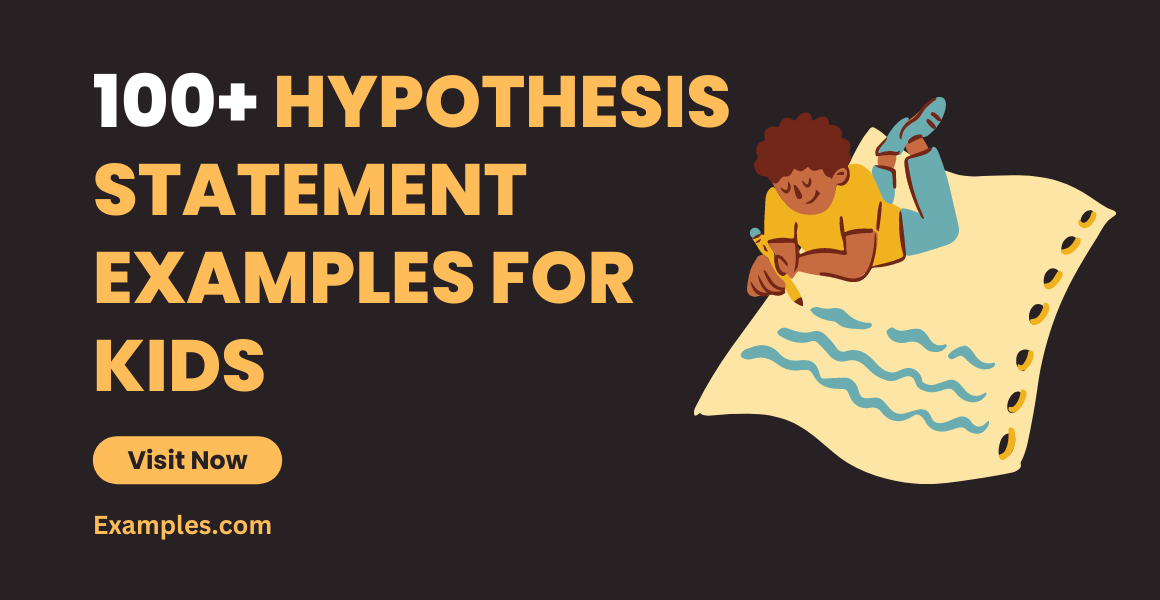
Crafting a hypothesis isn’t just for scientists in white lab coats; even young budding researchers can join in the fun! When kids learn to frame their curious wonders as hypothesis statements, they pave the way for exciting discoveries. Our guide breaks down the world of hypothesis writing into kid-friendly chunks, complete with relatable thesis statement examples and easy-to-follow tips. Dive in to spark a love for inquiry and nurture young scientific minds!
What is an example of a Hypothesis for Kids?
Question: Do plants grow taller when they are watered with coffee instead of water?
Hypothesis: If I water a plant with coffee instead of water, then the plant will not grow as tall because coffee might have substances that aren’t good for plants.
This hypothesis is based on a simple observation or question a child might have, and it predicts a specific outcome (the plant not growing as tall) due to a specific condition (being watered with coffee). It’s presented in simple language suitable for kids.
100 Kids Hypothesis Statement Examples
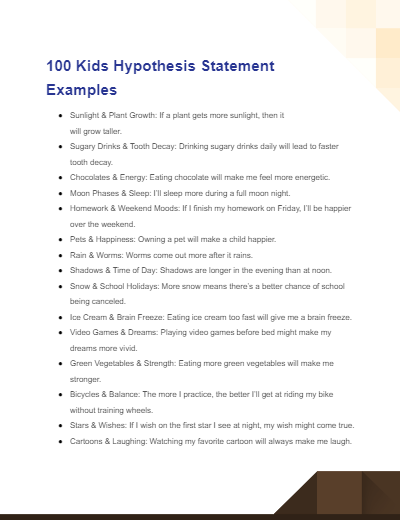
Size: 170 KB
Children’s innate curiosity lays the foundation for numerous questions about the world around them. Framing these questions as good hypothesis statements can transform them into exciting learning experiments. Presented below are relatable and straightforward examples crafted especially for young minds, offering them a structured way to articulate their wonders and predictions.
- Sunlight & Plant Growth : If a plant gets more sunlight, then it will grow taller.
- Sugary Drinks & Tooth Decay : Drinking sugary drinks daily will lead to faster tooth decay.
- Chocolates & Energy : Eating chocolate will make me feel more energetic.
- Moon Phases & Sleep : I’ll sleep more during a full moon night.
- Homework & Weekend Moods : If I finish my homework on Friday, I’ll be happier over the weekend.
- Pets & Happiness : Owning a pet will make a child happier.
- Rain & Worms : Worms come out more after it rains.
- Shadows & Time of Day : Shadows are longer in the evening than at noon.
- Snow & School Holidays : More snow means there’s a better chance of school being canceled.
- Ice Cream & Brain Freeze : Eating ice cream too fast will give me a brain freeze.
- Video Games & Dreams : Playing video games before bed might make my dreams more vivid.
- Green Vegetables & Strength : Eating more green vegetables will make me stronger.
- Bicycles & Balance : The more I practice, the better I’ll get at riding my bike without training wheels.
- Stars & Wishes : If I wish on the first star I see at night, my wish might come true.
- Cartoons & Laughing : Watching my favorite cartoon will always make me laugh.
- Soda & Bone Health : Drinking soda every day will make my bones weaker.
- Beach Visits & Sunburn : If I don’t wear sunscreen at the beach, I’ll get sunburned.
- Loud Noises & Pet Behavior : My cat hides when she hears loud noises.
- Bedtime & Morning Energy : Going to bed early will make me feel more energetic in the morning.
- Healthy Snacks & Hunger : Eating a healthy snack will keep me full for longer. …
- Toys & Sharing : The more toys I have, the more I want to share with my friends.
- Homemade Cookies & Taste : Homemade cookies always taste better than store-bought ones.
- Books & Imagination : The more books I read, the more adventures I can imagine.
- Jumping & Height : The more I practice, the higher I can jump.
- Singing & Mood : Singing my favorite song always makes me happy.
- Snowmen & Temperature : If the temperature rises, my snowman will melt faster.
- Costumes & Play : Wearing a costume will make playtime more fun.
- Gardening & Patience : Waiting for my plants to grow teaches me patience.
- Night Lights & Sleep : Having a night light makes it easier for me to sleep.
- Handwriting & Practice : The more I practice, the better my handwriting will become.
- Painting & Creativity : Using more colors in my painting lets me express my creativity better.
- Puzzles & Problem Solving : The more puzzles I solve, the better I become at problem-solving.
- Dancing & Coordination : The more I dance, the more coordinated I will become.
- Stargazing & Constellations : If I stargaze every night, I’ll recognize more constellations.
- Bird Watching & Species Knowledge : The more I watch birds, the more species I can identify.
- Cooking & Skill : If I help in the kitchen often, I’ll become a better cook.
- Swimming & Confidence : The more I swim, the more confident I become in the water.
- Trees & Birds’ Nests : The taller the tree, the more likely it is to have birds’ nests.
- Roller Skating & Balance : If I roller skate every weekend, I’ll improve my balance.
- Drawing & Observation : The more I draw, the better I become at observing details.
- Sandcastles & Water : If I use wet sand, I can build a stronger sandcastle.
- Hiking & Endurance : The more I hike, the farther I can walk without getting tired.
- Camping & Outdoor Skills : If I go camping often, I’ll learn more about surviving outdoors.
- Magic Tricks & Practice : The more I practice a magic trick, the better I’ll get at performing it.
- Stickers & Collection : If I collect stickers, my album will become more colorful.
- Board Games & Strategy : The more board games I play, the better strategist I’ll become.
- Pets & Responsibility : The more I take care of my pet, the more responsible I become.
- Music & Concentration : Listening to calm music while studying will help me concentrate better.
- Photographs & Memories : The more photos I take, the more memories I can preserve.
- Rainbows & Rain : If it rains while the sun is out, I might see a rainbow.
- Museums & Knowledge : Every time I visit a museum, I learn something new.
- Fruits & Health : Eating more fruits will keep me healthier.
- Stories & Vocabulary : The more stories I listen to, the more new words I learn.
- Trees & Fresh Air : The more trees there are in a park, the fresher the air will be.
- Diary & Feelings : Writing in my diary helps me understand my feelings better.
- Planets & Telescopes : If I look through a telescope, I’ll see more planets clearly.
- Crafting & Creativity : The more crafts I make, the more creative I become.
- Snowflakes & Patterns : Every snowflake has a unique pattern.
- Jokes & Laughter : The funnier the joke, the louder I’ll laugh.
- Riddles & Thinking : Solving riddles makes me think harder.
- Nature Walks & Observations : The quieter I am on a nature walk, the more animals I’ll spot.
- Building Blocks & Structures : The more blocks I use, the taller my tower will be.
- Kites & Wind : If there’s more wind, my kite will fly higher.
- Popcorn & Movie Nights : Watching a movie with popcorn makes it more enjoyable.
- Stars & Wishes : If I see a shooting star, I should make a wish.
- Diets & Energy : Eating a balanced diet gives me more energy for playtime.
- Clay & Sculptures : The more I play with clay, the better my sculptures will be.
- Insects & Magnifying Glass : Using a magnifying glass will let me see more details of tiny insects.
- Aquarium Visits & Marine Knowledge : Every time I visit the aquarium, I discover a new marine creature.
- Yoga & Flexibility : If I practice yoga daily, I’ll become more flexible.
- Toothpaste & Bubbles : The more toothpaste I use, the more bubbles I’ll get while brushing.
- Journals & Memories : Writing in my journal every day helps me remember special moments.
- Piggy Banks & Savings : The more coins I save, the heavier my piggy bank will get.
- Baking & Measurements : If I measure ingredients accurately, my cake will turn out better.
- Coloring Books & Art Skills : The more I color, the better I get at staying inside the lines.
- Picnics & Outdoor Fun : Having a picnic makes a sunny day even more enjoyable.
- Recycling & Environment : The more I recycle, the cleaner my environment will be.
- Treasure Hunts & Discoveries : Every treasure hunt has a new discovery waiting.
- Milk & Bone Health : Drinking milk daily will make my bones stronger.
- Puppet Shows & Stories : The more puppet shows I watch, the more stories I learn.
- Field Trips & Learning : Every field trip to a new place teaches me something different.
- Chores & Responsibility : The more chores I do, the more responsible I feel.
- Fishing & Patience : Fishing teaches me to be patient while waiting for a catch.
- Fairy Tales & Imagination : Listening to fairy tales expands my imagination.
- Homemade Pizza & Toppings : The more toppings I add, the tastier my homemade pizza will be.
- Gardens & Butterflies : If I plant more flowers, I’ll see more butterflies in my garden.
- Raincoats & Puddles : Wearing a raincoat lets me jump in puddles without getting wet.
- Gymnastics & Balance : The more I practice gymnastics, the better my balance will be.
- Origami & Craft Skills : The more origami I fold, the better my craft skills become.
- Basketball & Shooting Skills : The more I practice, the better I get at shooting baskets.
- Fireflies & Night Beauty : Catching fireflies makes summer nights magical.
- Books & Knowledge : The more books I read, the smarter I become.
- Pillows & Forts : With more pillows, I can build a bigger fort.
- Lemonade & Summers : Drinking lemonade makes hot summer days refreshing.
- Bicycles & Balance : The more I practice, the better I get at riding my bike without training wheels.
- Pencils & Drawings : If I have colored pencils, my drawings will be more colorful.
- Ice Cream & Happiness : Eating ice cream always makes me happy.
- Beach Visits & Shell Collections : Every time I visit the beach, I find new shells for my collection.
- Jump Ropes & Fitness : The more I jump rope, the fitter I become.
- Tea Parties & Imagination : Hosting tea parties lets my imagination run wild.
Simple Hypothesis Statement Examples for Kids
Simple hypothesis are straightforward predictions that can be tested easily. They help children understand the relationship between two variables. Here are some examples tailored just for kids.
- Plants & Sunlight : Plants placed near the window will grow taller than those in the dark.
- Chocolates & Happiness : Eating chocolates can make kids feel happier.
- Rain & Puddles : The more it rains, the bigger the puddles become.
- Homework & Learning : Doing homework helps kids understand lessons better.
- Toys & Sharing : Sharing toys with friends makes playtime more fun.
- Pets & Care : Taking care of a pet fish helps it live longer.
- Storytime & Sleep : Listening to a bedtime story helps kids sleep faster.
- Brushing & Cavity : Brushing teeth daily prevents cavities.
- Games & Skill : Playing a new game every day improves problem-solving skills.
- Baking & Patience : Waiting for cookies to bake teaches patience.
Hypothesis Statement Examples for Kids Psychology
Child psychology hypothesis delves into how kids think, behave, and process emotions. These hypotheses help understand the psychological aspects of children’s behaviors.
- Emotions & Colors : Kids might feel calm when surrounded by blue and energetic with red.
- Friendship & Self-esteem : Making friends can boost a child’s self-confidence.
- Learning Styles & Memory : Some kids remember better by seeing, while others by doing.
- Play & Development : Pretend play is crucial for cognitive development.
- Rewards & Motivation : Giving small rewards can motivate kids to finish tasks.
- Music & Mood : Listening to soft music can calm a child’s anxiety.
- Sibling Bonds & Sharing : Having siblings can influence a child’s willingness to share.
- Feedback & Performance : Positive feedback can improve a kid’s academic performance.
- Outdoor Play & Attention Span : Playing outside can help kids concentrate better in class.
- Dreams & Reality : Kids sometimes can’t differentiate between dreams and reality.
Hypothesis Examples in Kid Friendly Words
Phrasing hypothesis in simple words makes it relatable and easier for kids to grasp. Here are examples with kid-friendly language.
- Socks & Warmth : Wearing socks will keep my toes toasty.
- Jumping & Energy : The more I jump, the more energy I feel.
- Sandcastles & Water : A little water makes my sandcastle stand tall.
- Stickers & Smiles : Getting a sticker makes my day shine brighter.
- Rainbows & Rain : After the rain, I might see a rainbow.
- Slides & Speed : The taller the slide, the faster I go.
- Hugs & Love : Giving hugs makes me and my friends feel loved.
- Stars & Counting : The darker it is, the more stars I can count.
- Paint & Mess : The more paint I use, the messier it gets.
- Bubbles & Wind : If I blow my bubble wand, the wind will carry them high.
Hypothesis Statement Examples for Kids in Research
Even in a research setting, research hypothesis should be age-appropriate for kids. These examples focus on concepts children might encounter in structured studies.
- Reading & Vocabulary : Kids who read daily might have a richer vocabulary.
- Games & Math Skills : Playing number games can improve math skills.
- Experiments & Curiosity : Conducting science experiments can make kids more curious.
- Doodles & Creativity : Drawing daily might enhance a child’s creativity.
- Learning Methods & Retention : Kids who learn with visuals might remember lessons better.
- Discussions & Understanding : Talking about a topic can deepen understanding.
- Observation & Knowledge : Observing nature can increase a kid’s knowledge about the environment.
- Puzzles & Cognitive Skills : Solving puzzles regularly might enhance logical thinking.
- Music & Rhythmic Abilities : Kids who practice music might develop better rhythm skills.
- Teamwork & Social Skills : Group projects can boost a child’s social skills.
Hypothesis Statement Examples for Kids Science Fair
Science fairs are a chance for kids to delve into the world of experiments and observations. Here are hypotheses suitable for these events.
- Magnet & Metals : Certain metals will be attracted to a magnet.
- Plants & Colored Light : Plants might grow differently under blue and red lights.
- Eggs & Vinegar : An egg in vinegar might become bouncy.
- Solar Panels & Sunlight : Solar panels will generate more power on sunny days.
- Volcanoes & Eruptions : Mixing baking soda and vinegar will make a mini eruption.
- Mirrors & Reflection : Shiny surfaces can reflect light better than dull ones.
- Battery & Energy : Fresh batteries will make a toy run faster.
- Density & Floating : Objects with lower density will float in water.
- Shadows & Light Source : Moving the light source will change the shadow’s direction.
- Freezing & States : Water turns solid when kept in the freezer.
Hypothesis Statement Examples for Science Experiments
Experiments let kids test out their predictions in real-time. Here are hypotheses crafted for various scientific tests.
- Salt & Boiling Point : Adding salt will make water boil at a higher temperature.
- Plants & Music : Playing music might affect a plant’s growth rate.
- Rust & Moisture : Metals kept in a moist environment will rust faster.
- Candles & Oxygen : A candle will burn out faster in an enclosed jar.
- Fruits & Browning : Lemon juice can prevent cut fruits from browning.
- Yeast & Sugar : Adding sugar will make yeast activate more vigorously.
- Density & Layers : Different liquids will form layers based on their density.
- Acids & Bases : Red cabbage juice will change color in acids and bases.
- Soil Types & Water : Sandy soil will drain water faster than clay.
- Thermometers & Temperatures : Thermometers will show higher readings in the sun.
Hypothesis Statement Examples for Kids At Home
These hypotheses are crafted for experiments and observations kids can easily make at home, using everyday items.
- Chores & Time : Setting a timer will make me finish my chores faster.
- Pets & Behavior : My cat sleeps more during the day than at night.
- Recycling & Environment : Recycling more can reduce the trash in my home.
- Cooking & Tastes : Adding spices will change the taste of my food.
- Family Time & Bonding : Playing board games strengthens our family bond.
- Cleaning & Organization : Organizing my toys daily will keep my room tidier.
- Watering & Plant Health : Watering my plant regularly will keep its leaves green.
- Decor & Mood : Changing the room decor can influence my mood.
- Journals & Memories : Writing in my journal daily will help me remember fun events.
- Photos & Growth : Taking monthly photos will show how much I’ve grown.
How do you write a hypothesis for kids? – A Step by Step Guide
Step 1: Start with Curiosity Begin with a question that your child is curious about. This could be something simple, like “Why is the sky blue?” or “Do plants need sunlight to grow?”
Step 2: Observe and Research Before formulating the hypothesis, encourage your child to observe the world around them. If possible, read or watch videos about the topic to gather information. The idea is to get a general understanding of the subject.
Step 3: Keep it Simple For kids, it’s essential to keep the hypothesis straightforward and concise. Use language that is easy to understand and relatable to their age.
Step 4: Make a Predictable Statement Help your child frame their hypothesis as an “If… then…” statement. For example, “If I water a plant every day, then it will grow taller.”
Step 5: Ensure Testability Ensure that the hypothesis can be tested using simple experiments or observations. It should be something they can prove or disprove through hands-on activities.
Step 6: Avoid Certainty Teach kids that a hypothesis is not a definitive statement of fact but rather a best guess based on what they know. It’s okay if the hypothesis turns out to be wrong; the learning process is more important.
Step 7: Review and Refine After forming the initial hypothesis, review it with your child. Discuss if it can be made simpler or clearer. Refinement aids in better understanding and testing.
Step 8: Test the Hypothesis This is the fun part! Plan an experiment or set of observations to test the hypothesis. Whether the hypothesis is proven correct or not, the experience provides a learning opportunity.
Tips for Writing Hypothesis for Kids
- Encourage Curiosity : Always encourage your child to ask questions about the world around them. It’s the first step to formulating a hypothesis.
- Use Familiar Language : Use words that the child understands and can relate to. Avoid jargon or technical terms.
- Make it Fun : Turn the process of forming a hypothesis into a game or a storytelling session. This will keep kids engaged.
- Use Visual Aids : Kids often respond well to visuals. Drawing or using props can help in understanding and formulating the hypothesis.
- Stay Open-minded : It’s essential to teach kids that it’s okay if their hypothesis is wrong. The process of discovery and learning is what’s crucial.
- Practice Regularly : The more often kids practice forming hypotheses, the better they get at it. Use everyday situations as opportunities.
- Link to Real-life Scenarios : Relate the hypothesis to real-life situations or personal experiences. For instance, if discussing plants, you can relate it to a plant you have at home.
- Collaborate : Sometimes, two heads are better than one. Encourage group activities where kids can discuss and come up with hypotheses together.
- Encourage Documentation : Keeping a journal or notebook where they document their hypotheses and results can be a great learning tool.
- Celebrate Efforts : Regardless of whether the hypothesis was correct, celebrate the effort and the learning journey. This reinforces the idea that the process is more important than the outcome.
Text prompt
- Instructive
- Professional
10 Examples of Public speaking
20 Examples of Gas lighting
What is a hypothesis?
No. A hypothesis is sometimes described as an educated guess. That's not the same thing as a guess and not really a good description of a hypothesis either. Let's try working through an example.
If you put an ice cube on a plate and place it on the table, what will happen? A very young child might guess that it will still be there in a couple of hours. Most people would agree with the hypothesis that:
An ice cube will melt in less than 30 minutes.
You could put sit and watch the ice cube melt and think you've proved a hypothesis. But you will have missed some important steps.
For a good science fair project you need to do quite a bit of research before any experimenting. Start by finding some information about how and why water melts. You could read a book, do a bit of Google searching, or even ask an expert. For our example, you could learn about how temperature and air pressure can change the state of water. Don't forget that elevation above sea level changes air pressure too.
Now, using all your research, try to restate that hypothesis.
An ice cube will melt in less than 30 minutes in a room at sea level with a temperature of 20C or 68F.
But wait a minute. What is the ice made from? What if the ice cube was made from salt water, or you sprinkled salt on a regular ice cube? Time for some more research. Would adding salt make a difference? Turns out it does. Would other chemicals change the melting time?
Using this new information, let's try that hypothesis again.
An ice cube made with tap water will melt in less than 30 minutes in a room at sea level with a temperature of 20C or 68F.
Does that seem like an educated guess? No, it sounds like you are stating the obvious.
At this point, it is obvious only because of your research. You haven't actually done the experiment. Now it's time to run the experiment to support the hypothesis.
A hypothesis isn't an educated guess. It is a tentative explanation for an observation, phenomenon, or scientific problem that can be tested by further investigation.
Once you do the experiment and find out if it supports the hypothesis, it becomes part of scientific theory.
Notes to Parents:
- Every parent must use their own judgment in choosing which activities are safe for their own children. While Science Kids at Home makes every effort to provide activity ideas that are safe and fun for children it is your responsibility to choose the activities that are safe in your own home.
- Science Kids at Home has checked the external web links on this page that we created. We believe these links provide interesting information that is appropriate for kids. However, the internet is a constantly changing place and these links may not work or the external web site may have changed. We also have no control over the "Ads by Google" links, but these should be related to kids science and crafts. You are responsible for supervising your own children. If you ever find a link that you feel is inappropriate, please let us know.
Kids Science Gifts Science Experiments Science Fair Projects Science Topics Creative Kids Blog
Kids Crafts Privacy Policy Copyright © 2016 Science Kids at Home, all rights reserved.
Homeschool Science for Kids
Science designed for your homeschool family
Hypothesis: A Science Process Skill
January 25, 2021 By Janice VanCleave
A Hypothesis is a Well Thoughtout Prediction.
Yes, asking groups of kids to guess what will happen can be fun. But, expecting a hypothesis for every experiment defeats the purpose for this science process skill. A hypothesis relys on observations that have been previously made. Hypothesis are often called “educated” guesses. Please don’t require kids to give a hypothesis unless it can be based on previous knowledge. In other words, a hypothesis must be based on schema , which is previously learned information.
Using an Exploratory Experiment to provide needed schema for a hypothesis.
Research is any method used to learn more about a topic. Reading books, magazines as well as online sources and everyday observations of the world around you are good research methods. I suggest that research include exploratory experiments, such as those found in the science book shown. The following exploratory experiment was taken from , “201 Awesome, Magical, Bizarre & Incredible Experiments.” My intention in writing this and other experiment books was to provide fun experiments requiring around the house materials or materials easily found locally. These are exploratory experiments.
FYI: My books are sold on Amazon as well as other online books suppliers. If you sell my books contact me and I will add a link to your website.

Facts: Provide information that kids may not be familiar with before introducing the experiment.
- Pressure is the force pressing against a surface.
- Gas molecules move in a straight line until they collide with each other or their container. When colliding, the gas molecules, much like balls striking a wall changes direction and continues moving. Unlike a ball, each gas molecule collides, changes direction and continue at the same speed as before its collision.
Exploratory Experiment #141 Increasing
Problem: How does temperature affect air pressure? Materials: empty glass soda bottle (any glass bottle with a small mouth) 9-inch (23-cm) round balloon
Something More
Now that kids are engaged –have their schema turned on– introduce a problem related to the previous exploratory experiment.
4. Observe and record the appearance of the balloon over the bottle.
5. Place the open bottle and the bottle with the balloon in a freezer for 15 or more minutes. Note: You can sit the bottles in an ice chest with ice. Make sure both bottles are equally cooled and the chest is closed. Again, it is important for the air surrounding the bottles to be cold.
Share this:

Related posts:
- Science Process Skill: Identifying Variables
- How Salt Melts Ice
- Developing A Science Fair Project
- Coloring Changing Colorants
- Tutorial for Using Science Process Skills
- CAT Stickers
- Heat Energy
- Science Project Question
- Water Movement Through Xylem
- Forces: Balloon Rocket

IMAGES
VIDEO
COMMENTS
The meaning of hypothesis. Definition of hypothesis. Best online English dictionaries for children, with kid-friendly definitions, integrated thesaurus for kids, images, and animations. Spanish and Chinese language support available
A hypothesis is an educated guess, or a guess you make based on information you already know. After you make a hypothesis, then comes the really fun part: doing the science experiment to see what ...
A hypothesis is like a special guess that detectives (or in this case, scientists) make to find out why something happens. Let's say you wonder why plants grow. You might guess, 'I think plants grow because they get water.'. That's your hypothesis! It's your best idea right now for why plants grow. But hold on! Having a hypothesis isn't the end.
Hypothesis for Kids Examples. Here are some examples of hypotheses that are grade-level appropriate: Elementary school: “If I use warm water, then sugar will dissolve faster than in cold water.”. Middle school: “If I increase the density of the liquid, then the object will float higher.”.
Today, a hypothesis refers to an idea that needs to be tested. A hypothesis needs more work by the researcher in order to check it. A tested hypothesis that works, may become part of a theory or become a theory itself. The testing should be an attempt to prove the hypothesis is wrong. That is, there should be a way to falsify the hypothesis, at ...
Phrasing hypothesis in simple words makes it relatable and easier for kids to grasp. Here are examples with kid-friendly language. Socks & Warmth: Wearing socks will keep my toes toasty. Jumping & Energy: The more I jump, the more energy I feel. Sandcastles & Water: A little water makes my sandcastle stand tall.
Each level of the book conveys similar concepts, images, and vocabulary. Hypotheses. Hypotheses are statements that predict an outcome and provide a potential explanation for an experiment, based on prior knowledge. By using the resources below, students will learn about this important science skill and practice making good hypotheses.
Scientific Method Steps. As described above, there are specific steps that should be taken when using the scientific method. Here is an example of the steps: Ask a question. Gather information and observe (research) Make a hypothesis (guess the answer) Experiment and test your hypothesis. Analyze your test results.
An ice cube will melt in less than 30 minutes. You could put sit and watch the ice cube melt and think you've proved a hypothesis. But you will have missed some important steps. For a good science fair project you need to do quite a bit of research before any experimenting. Start by finding some information about how and why water melts.
A Hypothesis is a Well Thoughtout Prediction. Yes, asking groups of kids to guess what will happen can be fun. But, expecting a hypothesis for every experiment defeats the purpose for this science process skill. A hypothesis relys on observations that have been previously made. Hypothesis are often called “educated” guesses.